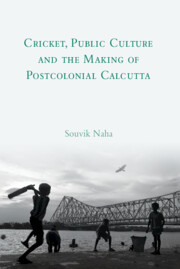Book contents
- Frontmatter
- Dedication
- Contents
- Acknowledgements
- List of Abbreviations
- Introduction
- 1 Cricket, Syndicated Englishness and Postcolonialism
- 2 Narratives of Cricket and Collective History
- 3 The Making of a City of Cricket
- 4 Politicians, Patronage and Centre–State Relations
- 5 Spectators, Gender and Public Space
- 6 The Moral Economy of Violent ‘Gentlemen’
- Conclusion
- Select Bibliography
- Index
6 - The Moral Economy of Violent ‘Gentlemen’
Published online by Cambridge University Press: 23 November 2022
- Frontmatter
- Dedication
- Contents
- Acknowledgements
- List of Abbreviations
- Introduction
- 1 Cricket, Syndicated Englishness and Postcolonialism
- 2 Narratives of Cricket and Collective History
- 3 The Making of a City of Cricket
- 4 Politicians, Patronage and Centre–State Relations
- 5 Spectators, Gender and Public Space
- 6 The Moral Economy of Violent ‘Gentlemen’
- Conclusion
- Select Bibliography
- Index
Summary
Calcutta’s cricket spectators are known to be volatile and fiercely partisan. In contrast with appreciation of their knowledge and understanding of the game, as outlined in the first two chapters, their violent behaviour in the galleries has undermined their dignity as spectators and cricket followers. Minor skirmishes aside, the Eden Gardens has seen four incidents of major violence that continue to be recounted in sports writings. In 1967, large sections of spectators clashed with the police, vandalised the stadium, and caused the day’s play to be abandoned. In 1969, six people died in a stampede as a vast crowd jostled for a limited number of tickets before play started. Match reports from the 1970s and the 1980s are full of incidents of fighting in the gallery and spectators pelting cricketers with food items, though without any serious harm or trouble like before. In two episodes of crowd trouble in 1996 and 1999, with India on the cusp of defeat, spectators threw various substances on the field and interrupted play. The first match was forfeited and the other played to an empty gallery after spectators were ejected out of the stadium. These two incidents led to a two-year ban for Calcutta as an international cricket venue from 1999 to 2001. The local, national and international press have structured these outbursts as reflections of a rapidly degenerating society, and as symbols of a culture of violence in West Bengal. Their reports, however, have reprised what E. P. Thompson called ‘a spasmodic view of popular history’, explaining problems of violence as ‘simple response stimuli’ to infringement of the people’s entitlements as spectators. This chapter will sift through press reports of these incidents to examine the general culture of violence in postcolonial Calcutta.
In many colonial societies, violence was not just a method of demand but also had an emancipatory value that helped people ‘recreate’ themselves, restoring the selfhood lost under colonial rule. Colonialism entailed authoritarian rule by violence and power, argues Frantz Fanon, and the colonised subversively appropriated and unified themselves through retaliatory violence. The violence that connected people drawn into the struggle against the colonial state retained its purpose when people protest againsted postcolonial governments.
- Type
- Chapter
- Information
- Cricket, Public Culture and the Making of Postcolonial Calcutta , pp. 207 - 250Publisher: Cambridge University PressPrint publication year: 2023



